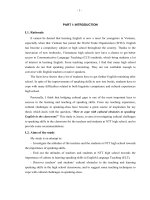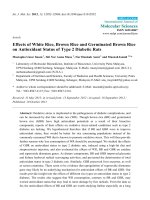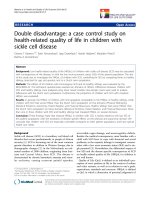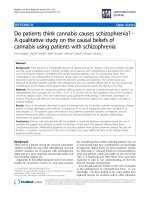Study on appropriate conditions to obtain germinated brown rice with high biological activities
Bạn đang xem bản rút gọn của tài liệu. Xem và tải ngay bản đầy đủ của tài liệu tại đây (681.3 KB, 11 trang )
Vietnam Journal of Science and Technology 57 (3B) (2019) 116-126
doi:10.15625/2525-2518/57/3B/14444
STUDY ON APPROPRIATE CONDITIONS TO OBTAIN
GERMINATED BROWN RICE WITH HIGH BIOLOGICAL
ACTIVITIES
Luu Anh Van1, Nguyen Truong Giang2, Nguyen Thanh Hang1, *
1
Department of Food Technology, School of Biotechnology and Food Technology,
Hanoi University of Science and Technology, 01 Dai Co Viet Str, Hai Ba Trung, Ha Noi
2
Department of Biotechnology, School of Biotechnology and Food Technology,
Hanoi University of Science and Technology, 01 Dai Co Viet Str, Hai Ba Trung, Ha Noi
*
Email:
Received: 25 September 2019; Accepted for publication: 2 November 2019
Abstract. Germinated brown rice strains contain more bioactive substances than germinated
regular rice ones, however germination conditions play an important role in the activity and the
content of those substances. The proper germination process provides the optimized active
ingredients from rice that can be used for the production of nutritious beverages. In this study,
we investigated the effects of pH, temperature and incubation time in microaerobic culture
condition on the change of bioactive substances in Anh Dao brown rice. The optimal
germination conditions with pH 3, temperature of 35 oC and duration of 36 hours release 109.11
U/g of the α-amylase activity, 17.22 (U/g) of the enzyme glutamate decacboxylase (GAD), 1.38
(U/g) of protease, 231.76 (mg/100 g dried weight) of GABA content and 21.9 (mg GAE/100 g
dried weight) of polyphenol from germinated Anh Dao brown rice. In nutrient evaluation,
germinated Anh Dao brown rice contains 65.53 % of starch, 2.49 % of lipid, 9.13 % of protein,
2.04 % of reducing sugar, and 1.26 % of ash.
Keywords: germinated brown rice, bioactive substances, α-amylase, protease, glutamate
decacboxylase (GAD), gamma aminobutyric acid (GABA).
Classification numbers: 1.2.1., 1.3.2.
1. INTRODUCTION
Many studies have shown that germination improved the nutritional quality of the rice. The
germination process of rice grain changed the nutritional component and structure of the grain
[1]. During germination of brown rice, the intracellular enzymes work and cleave large
molecular substances such as proteins, starches, etc. into small molecular substances. Starch in
germinated grains is hydrolyzed by the amylase into simple sugars, which enhances the
digestion process. Germination leads to the important nutritious changes such as the higher
levels of GABA (Gamma Aminobutyric Acid), other amino acids, unsaturated fats (tocotrienols
and Gamma oryzanol) [2].
Study on appropriate conditions to obtain germinated brown rice with high biological activities
The components of bioactive substances in germinated brown rice are influenced by several
factors such as germination time, temperature, pH, and nutrient contents [3]. The condition of
germination determines the quality of the bioactive substances in the germinated rice. There are
several studies about the germinated brown rice, however they mainly focus on the nutrient
contents but not on the bioactive substances or the hydrolysis products. Therefore, our study
aims to determine the factors that affect the enzyme activity and the content of bioactive
substances in brown rice germination.
2. MATERIALS AND METHODS
2.1. Materials and chemicals
The selected rice strain for the experiment is Anh Dao glutinous strain purchased at Thai
Binh Grain Corporation. Rice straw is removed by rice husk with Satake (Japanese) milling
machine. Brown rice obtained after grinding (average size 0.3 - 0.4 mm) was stored in plastic
bag at a temperature of 3–5 oC in the refrigerator for maximum 7 days.
Chemicals used: DNS (dinitrosalicylic acid), HCl, Na2HPO4, KH2PO4, NaCH3COO,
Na3C6H5O7 (sodium citrate), I2, KI from Merck company, Germany, starch and other chemicals
of Chinese companies.
2.2. Methods
2.2.1. Experimental method
Experiment 1: Study the effect of pH on the protease, GAD, Polyphenol and GABA
contents in the germination process of Anh Dao brown rice.
50 g of Anh Dao brown rice was soaked in citrate buffer at different pH levels (pH 2, 3, 4,
5, 6) at 30 C for 6 hours with the ratio of 1:2 (w/v) rice/water. Then the rice was harvested and
incubated at 30 °C for 24 hours for germination process. The obtained germinated rice was
ground finely and collected for the determination of the protease, GAD, Polyphenol and GABA
contents. The contents were determined by the percentage of dry weight.
Experiment 2: Study the effect of temperature on the protease, GAD and Polyphenol and
GABA contents in the germination process of Anh Dao brown rice.
The rice was carried out with the selected pH condition in the experiment 1 and then
incubated at different temperatures: 25, 30, 35, 37, 40 °C for 24 hours. The obtained germinated
rice was ground finely and collected for the determination of the protease, GAD, Polyphenol and
GABA contents.
Experiment 3: Study the effect of time on the protease, GAD and Polyphenol and GABA
contents in thegermination process of Anh Dao brown rice.
The rice was carried out with the selected pH condition in the experiment 1 and the selected
incubation temperature in the experiment 2. Then the rice was incubated at different times: 20,
24, 28, 32, 36, 40, 44 and 48 hours. The obtained germinated rice was ground finely and
collected for the determination of the protease, GAD, Polyphenol and GABA contents.
117
Luu Anh Van, Nguyen Truong Giang, Nguyen Thanh Hang
Experiment 4: Evaluating the composition of raw Anh Dao rice after germination
50 g of Anh Dao brown rice was carried out with the selected conditions in the experiment
1, 2 and 3. The obtained germinated rice was ground finely and collected for the determination
of the content of nutrients and bioactive substances in rice.
2.2.2. Method for determination of enzyme activity α– amylase by Rukhliadeva – Geriacheva [4]
2.2.3. Determination of protease enzyme activity by modified Anson method [4]
2.2.4. Determination of GAD enzyme activity by method of Zhang et al. [5]
2.2.5. Determination of GABA by spectrophotometer (by Karladee and Suriyong [6])
The GABA was extracted from the sample with 80 % ethanol, pH adjusted with 0.2 M
borate buffer. GABA then reacts with 6 % phenol reagents and 10 % sodium hypochlorite for
color measurement. The reaction solution was measured of optical density by UV/Vis device at
630 nm wavelength. The unit of GABA is mg/100 g dry weight.
2.2.6. Determination of polyphenol by colorimetric method using Folin – Ciocalteu reagent [4]
2.2.7. Other methods
- Determination of ash content was performed according to previous study [4].
- The moisture was analyzed based on dried samples to constant weight [4].
- Determination of the total protein content was performed following Kjeldahl method [4]
- The total lipid content was determined by using Soxhlet method [4].
2.2.8. Data processing methods
Each experiment was carried out 3 times. The results were processed by Microsoft Excel
2010 software with an error less than 0.05.
3. RESULTS AND DISCUSSION
3.1. Effect of pH on the protease, GAD and Polyphenol and GABA contents during the
germination of Anh Dao brown rice
The samples were prepared and the experiments were carried out according to Section 2.2.1.
3.1.1. Effect of pH on the protease activity
Figure 1 shows that protease activity is highest at pH 2 with a value of 1.21 U/g, the next
value was at pH 3 with 1.05 U/g and the lowest at pH 6 with a value of 0.55 U/g. Protease
activity increased by 1.47 - 3.27 times compared to brown rice without germination. This result
is similar to the results of Reihaneh Ahmadzadeh Ghavidel, (2011) [7], according to this
research group, the protease enzyme activity reaches the optimal activity at pH 2.5 - 5.5 in
118
Study on appropriate conditions to obtain germinated brown rice with high biological activities
acetate buffer environment. However, they also mentioned that the protease activity depended
on the quality of rice grain and the size of the grain.
1.4
Protease activity (U/g)
1.2
1.0
0.8
0.6
0.4
0.2
0.0
Brown rice
2
3
4
5
6
pH
Figure 1. Effect of pH on protease activity.
3.1.2. Effect of pH on GAD activity and GABA content in germinated brown rice
GAD activities in germinated brown rice under different pH conditions are shown in
Figure2. It has been shown that pH level had a strong influence on GAD activity of germinated
rice. GAD activity of brown rice was 3.32 U/g, after germination the highest GAD activity
reached at 10.64 U/g at pH 3, increasing 3.2 times. At pH6, the lowest GAD activity was 4.33
U/g. The research of Le Nguyen Doan Duy and Nguyen Cong Ha (2014) also showed that pH
had the effect on GAD activity in rice [8]. GAD is activated during pH treatment, converting
glutamic acid into a beneficial function as GABA for the body.
200
14
12
160
10
140
120
8
100
6
80
60
4
40
GAD Activity (U/g)
GABA (mg/100g dried weight )
180
2
20
0
0
Brown
rice
2
3
4
5
6 pH
GABA (mg/100g dried weight)
GAD Activity (U/g)
Figure 2. Effect of pH on GAD activity and GABA content.
119
Luu Anh Van, Nguyen Truong Giang, Nguyen Thanh Hang
GABA is synthesized during decarboxylase process accompanied by H+ ion consumption
(Karladeea, D., Suriyong (2012)) [9]. Therefore, the decreased pH enhances GABA production.
In addition, the previous studies also showed the pH levels from 2 to 6 were suitable for GAD
activity resulting to the high GABA content in brown rice. In addition to the pH values, the type
of buffer may also affect the GABA content during the germination [10, 11].
The results of the study in Figure 2 show that GABA content is highest (157.72 mg/100 g
dried weight) when brown rice soaked at pH 3, corresponding to 2.75 times higher than that in
untreated brown rice. The activity decreases gradually in the pH 4, 5 and lowest at pH 6 with
GABA content of 131.74 mg/100 g dried weight. This result correlates to the other previous
studies. For example, Charoenthaikij et al. [12] showed that the highest GABA content (67
mg/100 g dried weight) in KhaoDawk Mali 105 was obtained with citrate buffer at pH 3 for 48
hours. The study of Banchuen (2010) [10] showed that the highest GABA content at 8.36
mg/100 g dried weight of the rice strain Sangyod Phatthalung and Chiang Phatthalung with
citrate buffer at pH 3 for 36 hours. Similarly, the GABA content in the study of 6 rice strains of
(Koornneef et al.) [13] reached the highest 30.69 mg/100 g rice after 24-hour incubation with
citrate buffer at pH 3. Taken all together, our results show the correlation between GAD activity
and GABA content as in theory and in other previous studies [14].
3.1.3. Effect of pH on the polyphenol content in germinated brown rice
Figure.3 shows that polyphenol content of untreated brown rice is 10.59 mg GAE/100 g
dried weight. After germination process, polyphenol content reaches the highest amount at pH2
(21.23 mg GAE/100 g dried weight), as twice higher compared to that of untreated brown rice.
At pH 3 the polyphenol amount is 20.07 mg GAE/100 g dried weight, at pH 6 the lowest
polyphenol content is 13.71 mg GAE /100 g dried weight.
Polyphenol (mgGAE/100g dried weight)
25
20
15
10
5
0
Brown
rice
2
3
4
5
6
pH
Figure 3. Effect of pH on polyphenol content.
Taken together, this study has found that germinated Anh Dao brown rice contained the
highest amount of GAD and GABA contents at pH 3 treatment and the highest protease activity
and polyphenol content at pH 2 treatment. Our purpose is to prepare germinated brown rice for
the production of nutrient beverages, therefore we prefer the higher value of GAD and GABA
contents. We selected pH at 3 for further experiments.
120
Study on appropriate conditions to obtain germinated brown rice with high biological activities
3.2. Effect of incubation temperature on the protease, GAD and Polyphenol and GABA
contents during the germination of Anh Dao brown rice
The samples were prepared and the experiments were carried out according to Section
2.2.1.
3.2.1. Effect of temperature on the protease activity
1.4
Protease activity (U/g)
1.2
1
0.8
0.6
0.4
0.2
0
25
30
35
37
40
Temperature 0 C
Figure 4. Effect of incubation temperature on protease activity.
The results in Figure 4 show that the germination temperature affects the protease enzyme
activity in brown rice. The highest protease activity is 1.13 U/g dried weight at incubation
temperature of 35 °C, increasing 3.05 times compared to that of untreated rice (0.37 U/g). There
are not many studies on the protease activity in brown rice during the germination, however, the
results of Quan Le Ha [15], on the study of Moc Tuyen rice germination also showed that the
protease activity increased by 2.5 times after 8 days of germination.
3.2.2. Effect of incubation temperature on GAD activity and GABA content
200
15
12
150
125
9
100
6
75
GAD Activity (U/g)
GABA (mg/100g dried weight )
175
50
3
25
0
0
25
30
35
GABA (mg/100g dried weight )
37
40
Temperture 0 C
GAD Activity (U/g)
Figure 5. Effect of temperature on GAD enzyme activity and GABA content.
121
Luu Anh Van, Nguyen Truong Giang, Nguyen Thanh Hang
In Figure 5, GAD activity and GABA content increase during the germination process. In
details, GAD activity in germinated brown rice is highest as 11.93 U/g at 35 C that equivalent
to 3.59 times higher than that of untreated one (3.32 U/g). When the incubation temperature
increases to 40 C, GAD activity does not change significantly.
The GABA content in germinated brown rice reaches the highest as 177.12 mg/100 g dried
weight at 35 °C incubation, corresponding to 3.1 times higher than that of untreated one (57.33
mg/100 g dried weight) and the lowest GABA content is only 133.2 mg /100 g dried weight at
40 °C incubation. The highest obtained GABA is consistent with the highest GAD activity at 35
°C. However, at 40 °C GAD enzyme activity did not change much but the GABA content was
significantly low, which may be due to the inhibition of high temperature on the conversion of
glutamate to GABA content or activation of glutamate into other substances.
3.2.3. Effect of incubation temperature on the polyphenol content
The polyphenol contents in germinated brown rice under different temperatures are shown
in Figure 6. It could be seen that temperature affects polyphenol content in germination process;
however, the alteration is only in the range of 1.6 - 1.8 times. Polyphenol content reaches the
highest level of 19.05 mg GAE/100 g dried weight when incubated at 35 °C, and then gradually
decreased without significance. The incubation temperature range from 25 to 40 °C does not
have significant effect on the polyphenol content.
Polyphenol (mgGAE/100g dried weight
25
20
15
10
5
0
25
30
35
37
40
Temperature 0C
Figure 6. Effect of temperature on Polyphenol content.
Taken together, our result has been shown that the germination of brown rice at 35 °C leads
to the highest Protease, GAD and GABA, Polyphenol contents. Therefore, the temperature of
35 °C was selected for further experiments.
3.3. Effect of incubation time on the protease, GAD and Polyphenol and GABA contents
during the germination of Anh Dao brown rice
The samples were prepared and the experiments were carried out according to Section
2.2.1.
122
Study on appropriate conditions to obtain germinated brown rice with high biological activities
3.3.1. Effect of incubation time on the protease activity
2
Protease activity (U/g)
1.8
1.6
1.4
1.2
1
0.8
0.6
0.4
0.2
0
20
24
28
32
36
40
44
48
Time(h)
Figure 7. Effect of time on protease activity.
Protease activity increases during germination (Figure7). After 36 hours, the highest
protease activity is obtained at 1.38 U/g, and with further increased time, protease activity
reduces gradually.
3.3.2. Effect of incubation time on GAD activity and GABA.
In the brown rice grain, GAD activity is very low because of the low moisture in the grain.
GAD activity changes during the germination process because of the water supplement that
activates the GAD enzyme to synthesize GABA from glutamic acid (Dong-Hwa Cho, SeungTaik Lim [3]).
20
200
16
160
12
120
8
80
GAD Activity (U/g)
GABA (mg/100g dried weight)
240
4
40
0
0
20
24
28
32
36
GABA (mg/100gdried weight)
40
44
48
Time (h)
GAD Activity (U/g)
Figure 8. Effect of time on GAD enzyme activity and GABA content.
Research results in Figure 8 show that incubation time has a great influence on GAD
activity. GAD activity increased highly during germination time with the highest activity as
123
Luu Anh Van, Nguyen Truong Giang, Nguyen Thanh Hang
17.22 U/g after 36 hours of incubation, nearly 5 times higher than that in untreated rice.
However, when the incubation time increases to 48 hours, GAD activity decreases slightly. In
addition, GABA content also increases during incubation time from 20 hours to 36 hours and
reaches the highest content after 36 hours of incubation (231.76 mg/100 g dried weight). With
increasing further incubation time to 48 hours, GABA content decreases into 143.21 mg/100 g
dried weight. The GABA content correlates to GAD activity during the germination time.
In summary, incubation time has an influence on GABA, and GAD enzyme activity in
germinated brown rice. After 36 hours of incubation, germinated brown rice has the highest
GABA content of 231.76 mg/100 g dried weight and the highest GAD activity of 17.22 U/g.
3.3.3. Effect of incubation time on the polyphenol content
The results in Figure 9 show that incubation time affects polyphenol content during the
germination process. The polyphenol content reaches the highest value of 21.9 mg GAE/100 g
dried weight at 36 hours, afterward decreases gradually with the extension of incubation time.
Polyphenol (mgGAE/100g dried weight)
24
22
20
18
16
14
12
10
8
6
4
2
0
20
24
28
32
36
40
44
48
Time (h)
Figure 9. Effect of time on Polyphenol content.
Taken together, 36 hours incubation time is selected for germination process.
3.4. Evaluation of the composition of Anh Dao brown rice before and after germination
From Table 1, the amount of starch in germinated brown rice is lower than that of untreated
brown rice (from 86.11 % to 65.53 %, equivalent to 23.9 % reduction). Lipid content decreases
during the germination process, however, the reduced amount was not significantly (from
2.72 % to 2.49 %, equivalent to 8.5 % reduction). This result is consistent with other studies of
different grains such as soybean [16], corn [17] and spinach [18].
The reduction of nutrients such as starch and lipid is due to their conversion into energy for
germination process. Beside the reduction of starch and lipid, germination process provides
higher levels of protein, reduced sugar, -amylase, GAD, GABA and polyphenol contents in
brown rice.
124
Study on appropriate conditions to obtain germinated brown rice with high biological activities
Table 1. Evaluation of nutritional composition in brown rice and germinated brown rice.
Nutrients
Untreated Brown rice
Geminated Brown rice
Starch (% total dry weight)
86.11 ± 0.46
65.53 ± 0.53
Lipid (% total dry weight)
2.72 ± 0.15
2.49 ± 0.35
Protein (% total dry weight)
8.57 ± 0.21
9.13 ± 0.23
Reduced sugar (% total dry weight)
0.34 ± 0.02
2.04 ± 0.15
Ash (% total dry weight)
1.53 ± 0.07
1.26 ± 0.27
α–amylase (U/g)
34.91 ± 0.43
109.11 ± 0.7
Protease (U/g)
0.37 ± 0.03
1.28 ± 0.05
GAD (U/g)
3.32 ± 0.26
17.22 ± 0.57
GABA (mg/100g dry weight)
57.33 ± 0.56
231.76 ± 0.7
Polyphenol (mg GAE/100g dry weight)
10.59 ± 0.6
21.9 ± 0.8
4. CONCLUSION
This study investigated the effect of conditions of germination process on bioactive
substances in Anh Dao brown rice. The results indicate that the right conditions for obtaining the
highest bioactive substances of Anh Dao brown rice are pH 3, temperature at 35 oC and time of
36 hours. At that condition, geminated Anh Dao brown rice has GABA content of 231.76
(mg/100 g), α-amylase enzyme activity of 109.11 (U/g), GAD activity of 17.22 (U/g), and
protease of 1.28 (U/g), polyphenol of 21,9 (mg GAE/100 g). After germination, nutrient contents
of Anh Dao brown rice contain 65.53 % of starch, 2.49 % of lipid, 9.13 % of protein, 2.04 % of
reducing sugar, and 1.26 % of ash. Based on this study, germinated Anh Dao brown rice is
promising to be a suitable material for production of nutritious drinks.
REFERENCES
1.
Moongngarm A. and Saetung N. - Comparison of chemical compositions and bioactive
compounds of germinated rough rice and brown rice, Food chemical 122 (3) (2010) 782788.
2.
Cristina M. R. and Cristina M. - Gluten-Free Cereal Products and Beverages, Food
Science and Technology, 4 (2008) 81-100.
3.
Dong-Hwa C., Seung-Taik L. - Germinated brown rice and its bio-functional compounds,
Food Chemistry 196 (2016) 259–271.
4.
Le Thanh Mai (Ed) - Analysis methods used in fermentation technology. Science and
Technics publishing house, 2006, pp. 107 - 148.
5.
Zhang H., Yao H., Chen F., and Wang X. - Purification and characterization of glutamate
decarboxylase from rice germ, Food Chemistry 101 (2006) 1670 - 1676.
6.
Karladeea D., Suriyong S. - γ-Aminobutyric acid (GABA) content in different varieties of
brown rice during germination, Science Asia 38 (2012) 13–17.
125
Luu Anh Van, Nguyen Truong Giang, Nguyen Thanh Hang
7.
Reihaneh A. G., Davoodi M. - Evaluation of Changes in Phytase, α-Amylase and Protease
Activities of Some Legume Seeds during Germination, 2011 International Conference on
Bioscience, Biochemistry and Bioinformatics IPCBEE 5 (2011) 12–16.
8.
Le N. D. D., Nguyen C. H. - Influence of soaking and germination conditions on the γaminobutyric acid (GABA) content of 2 rice varieties (IR 50404 and Jasmine 85) from
Mekong Delta, Journal of Science and Development 12 (1) (2014) 59–64.
9.
Karladeea D., Suriyong S. - γ-Aminobutyric acid (GABA) content in different varieties of
brown rice during germination, Science Asia 38 (2012) 13–17.
10. Banchuen J. - Bio-active compounds in germinated brown rice and its application, The
Degree of Doctor of Philosophy in Food Technology Prince of Songkla University (2010)
11. Watcharaparpaiboon W., Laohakunjit P., Kerdchoechuen O. and Photchanachai S. Effects of pH, temperature and soaking time on qualities of germinated brown rice, J.
Agric. Sci (Suppl.) 29 (2007) 169–172.
12. Charoenthaikij P., Jangchud K., Jangchud A. and Tungtrakul P. - Germination conditions
affect physicochemical properties of germinated brown rice flour, Journal of food science
74 (2009) 658–665.
13. Koornneef M., Bentsink L. and Hilhorst H. - Seed Dormancy and Germination, Curr Opin
Plant Biol. 5 (2002) 33–36.
14. Khwanchai P., Chinprahast N., Pichyangkura R. and Chaiwanichsiri S. - GammaAminobutyric Acid and Glutamic Acid Contents, and the GAD Activity in Germinated
Brown Rice (Oryza sativa L.): Effect of Rice Cultivars, Food Sci. Biotechnol. 23 (2)
(2014) 373–379.
15. Quan Le Ha - Study on the characters and the application of enzymes catalyzing starch
and protein in beverage production, Doctor thesis, subject: Fermentation technology and
non-alcohol beverage, Hanoi University of Science and Technology 1998, pp. 23–45 (in
Vietnamese).
16. Fernandez D. E., Qu R., Huang A. H. C., Staehelin L. A. - Immunogold localization of the
L3 protein of maize lipid bodies during germination and seedling growth, Plant Physiol.
86 (1988) 270–274.
17. Gamel T. H., Mesallam A. S., Damir A. A., Shekib L. A., Linssen J. P. - Characterization
of amaranth seed oils, J Food Lipids 14 (2007) 323–334.
18. Tortayeva1 D., Hettiarachchy N., Horax R., Eswaranandam S., Jha A. - Effects of
Germination on Nutrient Composition of Long Grain Rice and its Protein PhysicoChemical and Functional Properties, J Food Nutr. 1 (2014) 1–9.
126









